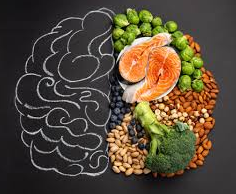ntroduction: Understanding the Connection Between Nutrition and Mental Health
Mental health is influenced by a multitude of factors, including genetics, environment, and lifestyle. One increasingly recognized factor is nutrition. What we eat can significantly affect our mood, cognitive function, and overall mental well-being. This article explores the vital role of nutrition in mental health, highlighting how dietary choices can impact emotional health, cognitive performance, and mental disorders.
The Brain-Gut Connection
The Gut Microbiome The gut microbiome, a complex community of trillions of microorganisms, plays a crucial role in mental health. Research has shown that a healthy gut can positively influence brain function and mood. The gut produces neurotransmitters like serotonin, which regulates mood and emotions. A diet rich in probiotics and prebiotics can support a healthy gut microbiome.
- The Gut-Brain Axis The gut and brain communicate through a network known as the gut-brain axis. This connection enables signals from the gut to influence brain function. For example, inflammation in the gut can lead to neuroinflammation, which is linked to mental health disorders such as anxiety and depression.
Nutrients That Influence Mental Health
- Omega-3 Fatty Acids Omega-3 fatty acids, found in fatty fish (like salmon), walnuts, and flaxseeds, are essential for brain health. They help reduce inflammation and support neurotransmitter function, which is vital for mood regulation. Studies have shown that individuals with higher omega-3 intake report lower levels of depression and anxiety.
- B Vitamins B vitamins, including B6, B12, and folate, are crucial for producing neurotransmitters like serotonin and dopamine. Deficiencies in these vitamins can lead to mood disorders and cognitive decline. Foods rich in B vitamins include leafy greens, whole grains, eggs, and dairy products.
- Antioxidants Antioxidants, found in fruits and vegetables, combat oxidative stress in the brain, which can contribute to mental health disorders. Foods high in antioxidants, such as berries, dark chocolate, and nuts, may help protect brain health and improve mood.
- Amino Acids Amino acids are the building blocks of proteins and are crucial for neurotransmitter production. For example, tryptophan is an amino acid that helps produce serotonin. Foods rich in protein, such as lean meats, fish, eggs, and legumes, can support neurotransmitter function and mood regulation.
- Complex Carbohydrates Complex carbohydrates, found in whole grains, fruits, and vegetables, are essential for maintaining stable blood sugar levels. Fluctuations in blood sugar can affect mood and energy levels. Consuming complex carbs can help stabilize mood and promote overall mental health.
The Impact of Processed Foods
- Sugar and Mental Health High sugar consumption has been linked to increased anxiety and depressive symptoms. Sugar can cause spikes and crashes in blood glucose levels, leading to mood swings and irritability. A diet high in refined sugars may also contribute to chronic inflammation, which is associated with mental health disorders.
- Processed and Fast Foods Diets high in processed and fast foods often lack essential nutrients and are rich in unhealthy fats and sugars. Studies have shown a correlation between the consumption of ultra-processed foods and higher rates of depression and anxiety. These foods may negatively affect brain health and overall well-being.
Dietary Patterns Linked to Mental Health
- Mediterranean Diet The Mediterranean diet, rich in fruits, vegetables, whole grains, fish, and healthy fats, has been associated with improved mental health outcomes. This diet is high in antioxidants, omega-3 fatty acids, and essential nutrients that support brain function and mood regulation.
- DASH Diet The Dietary Approaches to Stop Hypertension (DASH) diet, originally designed to lower blood pressure, has also shown benefits for mental health. This diet emphasizes whole foods, lean proteins, and plenty of fruits and vegetables, which can improve mood and cognitive function.
- Plant-Based Diets Increasing evidence suggests that plant-based diets may positively influence mental health. These diets are typically high in antioxidants, fiber, and essential nutrients, promoting a healthy gut microbiome and reducing inflammation.
Practical Tips for Improving Nutrition and Mental Health
- Incorporate Nutrient-Dense Foods Focus on incorporating a variety of whole, nutrient-dense foods into your diet. Aim for colorful fruits and vegetables, whole grains, lean proteins, and healthy fats.
- Mindful Eating Practice mindful eating by paying attention to hunger cues and enjoying your meals without distractions. This can help develop a healthier relationship with food and improve overall well-being.
- Stay Hydrated Dehydration can impact cognitive function and mood. Ensure you drink enough water throughout the day to stay hydrated and support optimal brain function.
- Limit Processed Foods Reduce the intake of processed and fast foods, which can negatively affect mental health. Opt for whole, minimally processed options instead.
- Seek Professional Guidance If you’re struggling with mental health issues or dietary choices, consider seeking help from a registered dietitian or mental health professional. They can provide personalized guidance to improve your nutrition and mental well-being.
Conclusion: Nourishing Your Mind Through Nutrition
Nutrition plays a vital role in mental health and well-being. By understanding the impact of dietary choices on mood, cognitive function, and mental disorders, individuals can take proactive steps to improve their mental health through nutrition. A balanced diet rich in essential nutrients can support brain health, enhance mood, and promote overall mental well-being.
Sources:
- Sylvester, B. D., et al. “Diet and Mental Health: A Review.” American Journal of Lifestyle Medicine, vol. 13, no. 5, 2019, pp. 480-487.
- Hu, F. B. “Diet, Lifestyle, and Genetic Risk Factors for Type 2 Diabetes: A Perspective.” Diabetes Care, vol. 39, no. 10, 2016, pp. 1745-1751.
- Jacka, F. N., et al. “Association of Western and Traditional Diets with Depression and Anxiety in Women.” American Journal of Psychiatry, vol. 168, no. 3, 2011, pp. 245-251.
- Lopresti, A. L., et al. “The Role of Diet in the Management of Mental Disorders.” Nutrition Reviews, vol. 75, no. 8, 2017, pp. 635-645.
- O’Neil, A., et al. “The Association Between Diet and Mental Health in Children and Adolescents: A Systematic Review.” Nutrients, vol. 12, no. 8, 2020, p. 2354.

